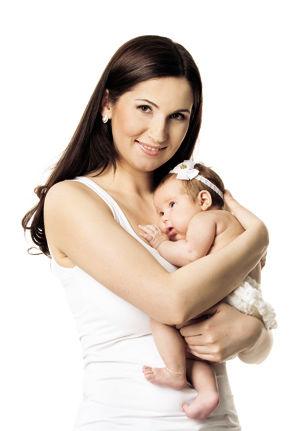Bonding With Your Baby: How to Enhance Oxytocin – Your ‘Love Hormone’
By Doraine Bailey
 From the outside, being a mother must seem like a horrible thing. After all, you’re up all hours of the day and night caring for a messy and demanding baby.
From the outside, being a mother must seem like a horrible thing. After all, you’re up all hours of the day and night caring for a messy and demanding baby.
However, mothers and their babies have easy access to a hormone that fosters patience, relaxation, empathy, generosity and love: Oxytocin.
Oxytocin is a hormone that helps promote attachment, or bonding, for both baby and mom.
Sometimes called the “Love Hormone” or the “Moral Molecule,” oxytocin makes us “feel good” when we have a pleasant experience with another person.
This makes us more interested in having other pleasant experiences, as well as helping other people feel better, because we release oxytocin at these times too.
For mothers, oxytocin helps them be more aware of a baby’s needs and promotes “empathic concern” for the baby (and others).
At birth, mom’s body is already flooded with oxytocin from labor.
When baby is placed skin to skin on her chest, oxytocin is released again, rewarding the mother with warm and relaxing feelings that encourage her to hold and protect the newborn.
Keeping mom and baby together, and even skin-to-skin, as much as possible in the early days triggers releases of oxytocin, which in turn reward mom for staying with the baby, which releases more oxytocin, and so on.
During breastfeeding, oxytocin helps release milk to the baby. In this way, some oxytocin also goes directly to the baby, promoting her own sense of attachment with mom.
In each breastfeeding episode, mom holds baby close and interacts with the baby, again reinforcing that “feel good” experience.
Oxytocin helps mom be less distracted and more attuned to the baby, decreases discomfort and pain, and helps her cope with the day-to-day stresses of mothering.
It promotes a “virtuous cycle,” which positively reinforces the time and effort she is giving to the baby.
It also promotes a virtuous cycle for the baby, building trust of early responsiveness by adults and a safe environment.
In turn, that helps babies better handle their own stress.
Mothers (and fathers) continue to release small doses of oxytocin when holding, feeding or rocking a contented baby.
Nothing releases oxytocin better than a mother who is able to calm her baby, and a baby who responds to a mother’s consistent and reliable attention.
On the other hand, nothing undermines oxytocin as much as when mom is unable to console her baby.
Anger, frustration, feeling manipulated by the baby and wanting to punish the baby for its innocent calls for help release stress hormones like cortisol and block a mother’s (or other caregiver’s) response to oxytocin.
This “non-virtuous” cycle can also become habit, decreasing the parent’s responsiveness and creating in the baby a fundamental perception of mistrust of the world.
Research shows that when children live in a household dominated by aggression and a lack of positive attention, they grow up to be more aggressive, untrusting, lonely and sick.

